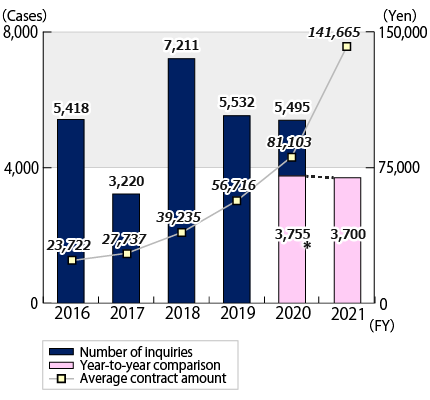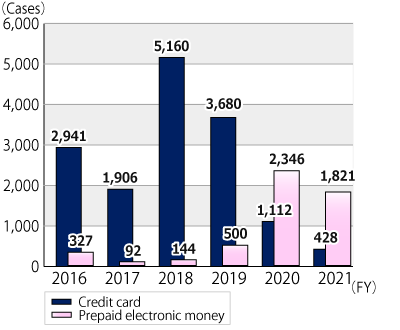Beware of technical support scams! Security warning pop-up and beep sound are fake! Never call the number nor pay with e-money or credit card!
Local consumer affairs centers and the like across Japan have received inquiries and complaints about technical support scams. In this kind of cases, consumers get in trouble like this: when using the Internet, a fake pop-up message "Infected with virus" is suddenly displayed with beep sound, which tricks users into calling the number in the pop-up window. When fraudsters are contacted by phone, they induce consumers to make a contract for paid technical support and security software. In recent years, over 5000 inquiries about technical support scams are received per year and the average contract amount is rapidly increasing year by year (See Diagram 1). There has been a surge in the use of prepaid electronic money in these cases (See Diagram 2). Elderly consumers have been most vulnerable to technical support scams.
In November 2018, NCAC issued an alert on technical support scams. In light of the recent increase in inquiries related to the scams, NCAC decided to issue a consumer alert again in cooperation with the Japan Cybercrime Control Center and the Information-Technology Promotion Agency, Japan.
Diagram 1: Number of inquiries about technical support scams registered with PIO-NET1 and average contract amount per year

* The number 3755 in the pink portion shows data registered with PIO-NET from April 1, 2020 through December 31 2020 for a year-to-year comparison.
The inquires amounted to 5418 in FY2016, 3220 in FY2017, 7211 in FY2018, 5532 in FY2019, 5495 in FY2020 and 3700 in FY2021 through the end of December 2021.
The average contract amount was 23722 yen in FY2016, 27737 yen in FY2017, 39235 yen in FY2018, 56716 yen in FY2019, 81103 yen in FY2020 and 141665 yen in FY2021 through the end of December 2021.
- 1 PIO-NET is a database that collects information on inquiries concerning consumer affairs by linking NCAC with local consumer affairs centers and similar organizations across Japan via an online network. This article uses data through December 31, 2021.
Diagram 2: Transition of payment methods demanded by fraudsters

The number of credit card uses was 2941 in FY2016, 1906 in FY2017, 5160 in FY2018, 3680 in FY2019, 1112 in FY2020 and 428 in FY2021 through the end of December 2021.
The number of prepaid e-money uses was 327 in FY2016, 92 in FY2017, 144 in FY2018, 500 in FY2019, 2346 in FY2020 and 1821 in FY2021 through the end of December 2021.
Sample Cases
- [Case 1]
- A warning pop-up was displayed with beep sound on my PC screen. Then I called the number in the pop-up window to get technical support. I was charged for removing a virus on my PC.
- [Case 2]
- I was charged for technical support repeatedly and I paid the bill with prepaid electronic money.
- [Case 3]
- A convenience store clerk made me realize that I was tricked by a scammer. The advice prevented me from falling victim to the scam.
Characteristics and problems highlighted
- Sudden warning pop-ups with beep sound worry consumers and trick them into calling the number in the pop-up window.
- If a consumer calls the number, a fraudster makes the consumer more uneasy and encourages to make a contract for paid technical support.
- Surge of cases where fraudsters press consumers to pay with prepaid electronic money - they demand money one after another.
- An increasing number of consumers aged 60 and older are victimized.
- It's often difficult to communicate with a fake support person over the phone.
Advice for consumers
- When a warning pop-up appears on your screen, doubt it first. Never call the number in the pop-up window.
- Even if a warning pop-up is shown with beep sound, stay calm. Check your device by yourself.
- If you cannot judge if the device is all right, turn to someone around you for advice.
- In case of payment with prepaid electronic money, withdraw the electronic money earlier than the fraudster or contact the issuer of the prepaid e-money card. In case of payment with a credit card, consult with the credit card company.
- In case of trouble or concern, consult your local consumer affairs center right away.
